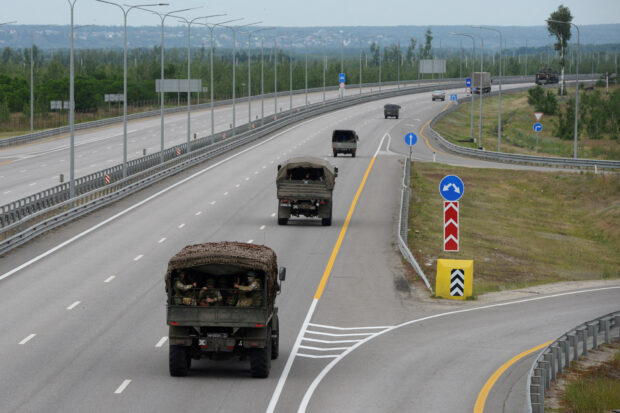
A military column of Wagner private mercenary group drives along M-4 highway, which links the capital Moscow with Russia’s southern cities, near Voronezh, Russia, June 24, 2023. REUTERS
MOSCOW/KYIV — Muscovites on Saturday expressed unease or dismissed as political theater a standoff pitting the Kremlin against Wagner mercenaries who had vowed to descend on the capital in a “march of justice” denouncing the conduct of the war in Ukraine.
Ukrainians, on the other hand, were clearly satisfied, sometimes gleeful, at the prospect of a split in Russian ranks 16 months after the Kremlin’s troops invaded their country.
Moscow Mayor Sergei Sobyanin, an ally of President Vladimir Putin, had declared that a “counter-terrorism regime” was in force, before the leader of the Wagner private militia announced that his fighters would turn back to avoid bloodshed.
Yevgeny Prigozhin had said he wanted to oust the army’s top brass and “restore justice”, while Putin had promised to crush the mutiny.
One Moscow resident who gave his name as Nikolai – declining like others to give his surname – watched the military take up positions to protect the city.
“It’s frightening of course – you sit at home thinking about what might happen,” he told Reuters. “It’s disturbing, both for you and your loved ones.”
Some residents found it hard to grasp the scale of events.
“It’s really tough news, really unexpected. I’ve just come back from university. I’ve just done my last exam – and the news was really unexpected as I was prepping (for the exam) last night,” said Vladimir, a student. “I don’t really know how to react. I haven’t really got my head around it yet.”
In Kyiv’s Independence Square, packed with residents enjoying a stroll, Natalia Tanich, 48, acknowledged a certain pleasure in watching the Russian standoff.
“I enjoy what is happening in Russia. The inevitable conflict between Prigozhin and Putin was expected,” she said. “I don’t know what may come out of it. But I wish for them to shoot each other and die.”
In Kkarkiv, Ukraine’s second city subjected to frequent shelling since the invasion, Ivan said the confrontation was a consequence of volatile politics and the protracted conflict.
“They started the war and now they are getting it back. The harder you compress a spring, the harder it comes back,” he said. “The situation was compressed to such an extent in Russia that it became hopeless. I consider what happened a natural event. It will influence the war but I think it will not be over in a day. We will have to endure a bit.”
Post-Soviet showcase
In Moscow, under Mayor Sobyanin, the state has spent vast amounts to transform the city into an urban showcase with relatively low crime. That is a far cry from the drab Soviet era, and the 1990s when it was plagued by contract killings or, later, suffered attacks by Chechen separatists.
A woman called Galina said she thought what was happening was some kind of “provocation”.
“It doesn’t frighten me at all,” she said. “I have confidence in our president and our people.”
One man who declined to be named at all said he thought it was just politics playing out.
“They might cancel a few events, and I make my living from events. I have an event going on now, so I could lose out because of this,” he said.
“But otherwise, it’s their business, it’s politics – let them get on with it.”